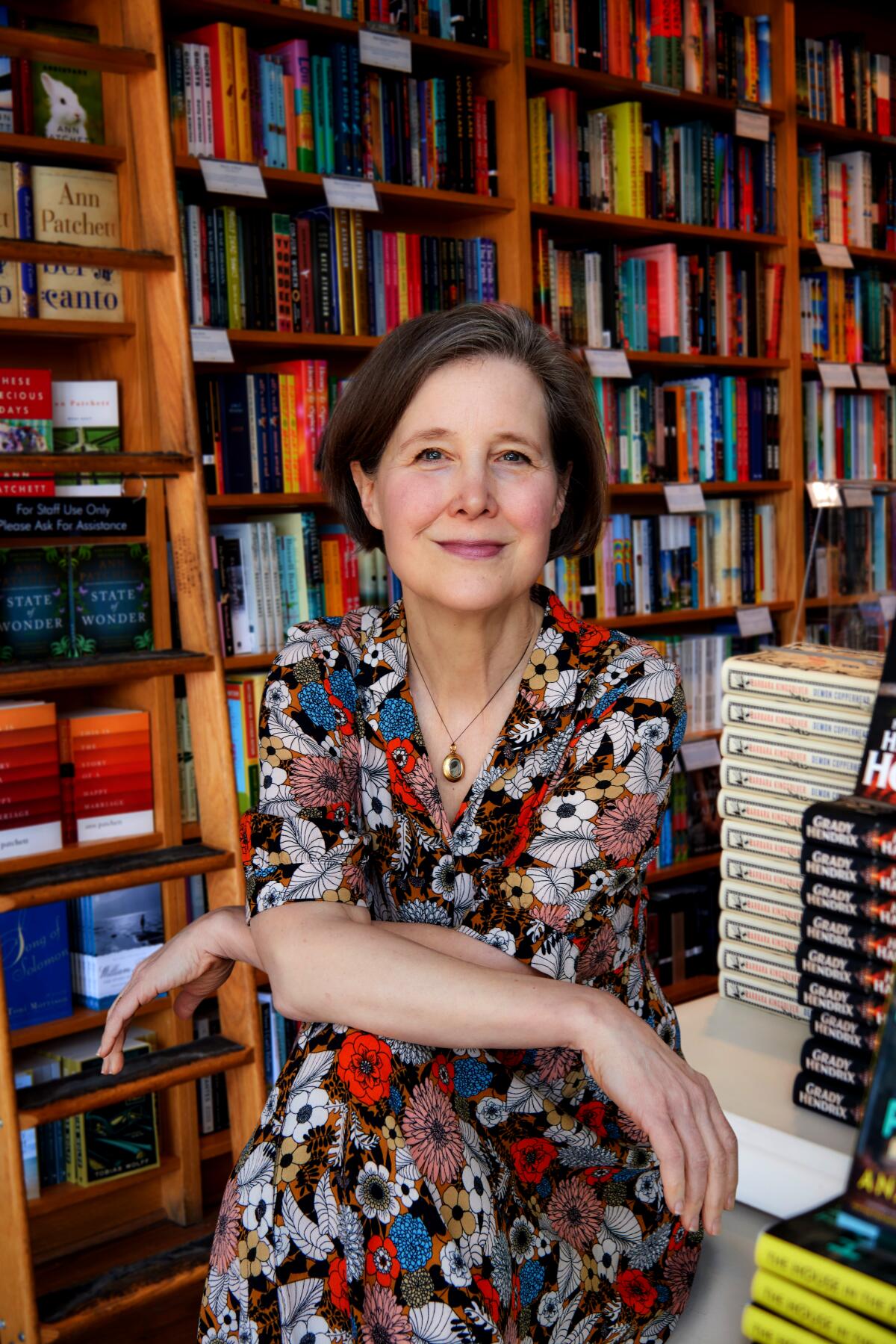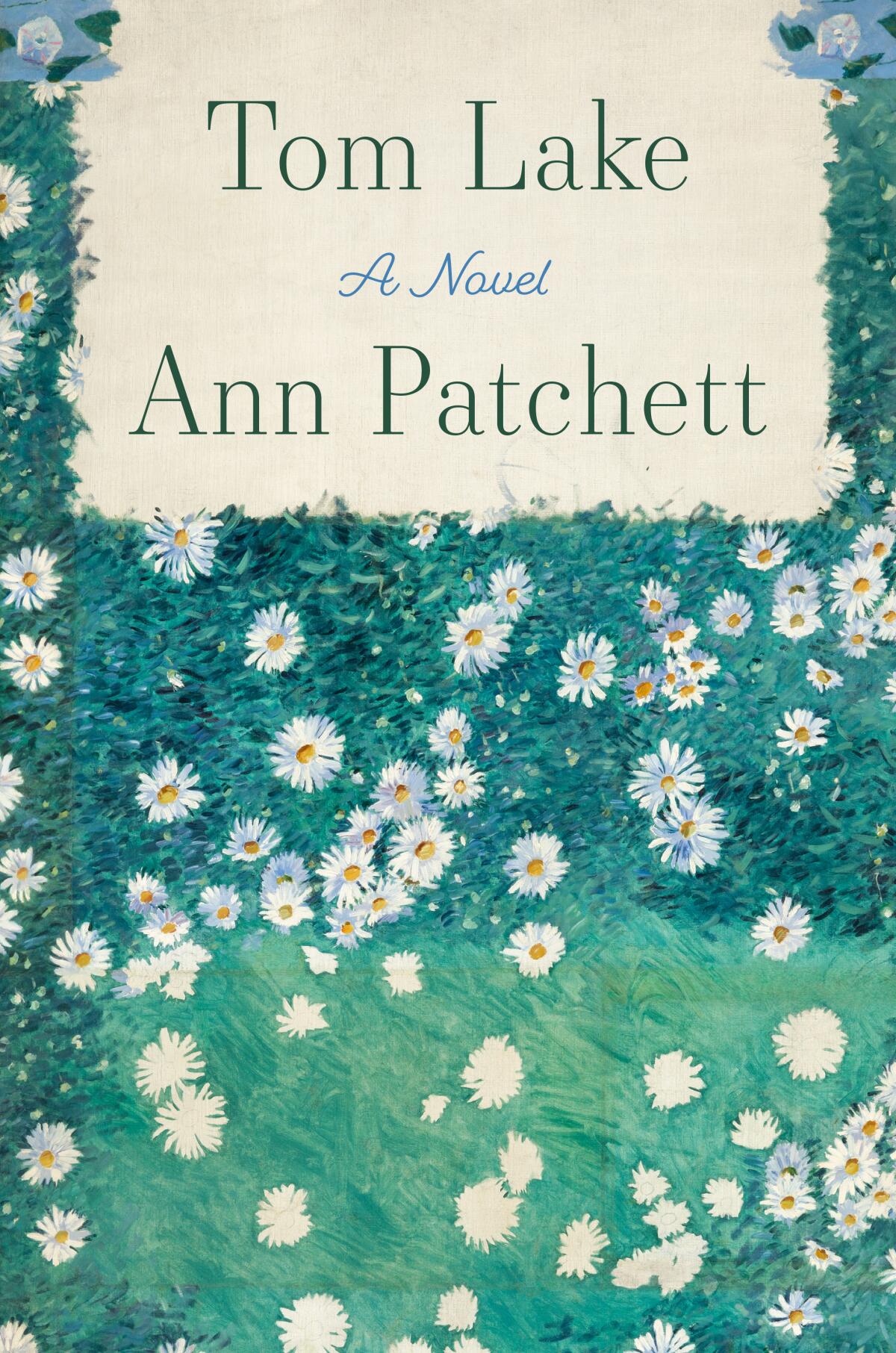How Ann Patchett puts her ‘moral core’ into her novels

- Share via
On the Shelf
Tom Lake
By Ann Patchett
Harper: 320 pages, $30
If you buy books linked on our site, The Times may earn a commission from Bookshop.org, whose fees support independent bookstores.
Ann Patchett needs no introduction. She might be America’s favorite novelist, with books that sell instantly and forever: “Bel Canto,” “State of Wonder,” “Commonwealth,” “The Dutch House.” Her latest, “Tom Lake,” is out next week and will surely do the same.
She writes with deep attention to our country’s changing culture while never taking her eye off narrative. Each book uses a traditional storytelling structure — lyrics, midrash, folk tales — while pushing at the edges of what a form can contain, cramming it with modern human concerns, triumphs and tragedies.
But perhaps Patchett does need a reintroduction, because along with elevating both the mundane and the magical into literary fiction, she’s become one of America’s most important independent booksellers. The owner of Parnassus Books in Nashville, Patchett is at the forefront of an industry plagued by a sense of disconnection from its audience. She has put her money, energy and imagination into not just books and literature but also ideas and community. So it makes perfect sense that, as she spoke via Zoom from her Nashville home, the author would start out explaining “Tom Lake” through her ideas about community.
Bestselling author Ann Patchett talks about book tours, Tom Hanks and ‘These Precious Days,’ her new book of essays.
“I grew up here and moved away, but now people want to live in Nashville, and it just makes no sense to me,” Patchett says. “But I think a lot about the young people who work in the bookstore, and what they have to deal with. I’m not their mother, but being around them reminds me of things that I was interested in at that time in my life, which were questions like, ‘Can I afford to go out to dinner? What time do you make a long-distance call home?’”
But times, like telephone data plans, have changed. “These young people now are worrying about climate crisis and trans rights and this whole slew of things that never entered my mind when I was in my 20s. I knew people then who had depression, but not anxiety. Now I see how much time and energy it takes up in a young person’s life.”
“Tom Lake,” Patchett’s ninth novel, begins with the anxiety of young people, as Lara and Joe Nelson face the COVID pandemic with all three of their daughters back home at their Michigan fruit farm. This three-sistered orchard setting deliberately calls Anton Chekhov to mind, but Patchett’s bigger literary fish to fry is the text she calls her foundation, Thornton Wilder’s “Our Town.” Lara famously portrayed “Our Town’s” Emily years back; moreover, a story she tells her family about her drama years provides both the novel’s framing device and a Wilder-esque lesson in paying attention to what matters most.
Maisie, Emily and Nell “are stuck at home in the way we used to be stuck at home,” says Patchett, “and while they have plenty of physical labor to do, they can’t go outside of the farm, and they have to rely on storytelling for their entertainment.”
It’s a good fit for Patchett, because writing about people cut off from the world is “my wheelhouse. No matter how hard I try not to do that, I get to the end of the book, whether it’s ‘Patron Saint of Liars’ or ‘State of Wonder,’ and I’m like, hey, look, I did the thing again.”
Over the last three months, 17 writers provided diaries to the Times of their days in isolation, followed by weeks of protest. This is their story.
Patchett decided to limit her characters’ access to communication — perhaps because she limits her own access. “I have a flip phone, but I only use it when I travel,” she says. “I’m not on any social media. How do you keep a plot going when you have a device in someone’s hand that just constantly reveals and connects people? So early on, Lara asks her daughters to just put their phones down.”
Storytelling becomes the family’s mainstay — specifically Lara’s story about her long-ago romance with a now-famous actor named Peter Duke. The most fascinating thing about Patchett’s own story is that while she has written often about families and children, she does not have children of her own.

“Somehow I really understood when I was a kid that I couldn’t be the solitary creature that I am and have another living being with me 24/7,” she says. “I would have loved children and I probably would have been really good at parenting. I am an even-keeled, loving person with great domestic skills. And yet I know I would not have been able to limit either side of my life.”
She mentions that her colleague Lauren Groff has a contract with her husband forbidding contact with the family until late afternoon. “If I’d known her when I was younger, Lauren Groff’s method could have changed my life,” Patchett says. “I am completely at peace with my life as it is now and I don’t second-guess myself one bit, but I can imagine it could have been different without believing that there was only one path.”
The path not taken is very much at the heart of “Tom Lake.” The Nelson daughters find it hard to believe anyone would have passed up the chance to be tied to a movie star, perhaps become a movie star herself. “The choices she has made are mystifying to them, even though they can see her happiness,” she says. “And Lara does love her life. She loves that farm. She loves Joe, and the family they have made. One of her reasons for telling the story is so that maybe this time her girls will see that the quiet deep thing that comes later is so much better.”
Ann Patchett reveals the route to her bestseller and how she’ll battle Amazon. (Shop dogs help.)
She pauses to consider her own statement. “I really believe that,” she says. “I’ve been married for 29 years, and I’m happily married. It’s impossible not to write about what matters to you. You can make up people all day long, but they still have your moral core in a way — or they’re working against it.”
Patchett says a recent interviewer who was 24, “Maisie’s age,” asked her why she kept all the important themes — the pandemic, racism, climate change, reproductive rights — in the background of her work. “I told her: Because that’s where it is. No matter how much these things overwhelm and terrify us, we get up and go to work and see our friends and love the people we love and make food and vacuum and feed the dog. It’s unsustainable to take all of the things that terrify us and keep them in the front.”
Call it realism; it might also be Patchett’s secret recipe for managing the modern world.
Patrick is a freelance critic, podcaster and author of the memoir “Life B.”
More to Read
Sign up for our Book Club newsletter
Get the latest news, events and more from the Los Angeles Times Book Club, and help us get L.A. reading and talking.
You may occasionally receive promotional content from the Los Angeles Times.







